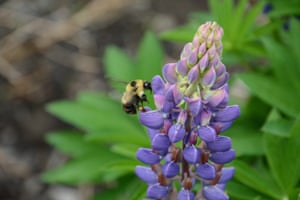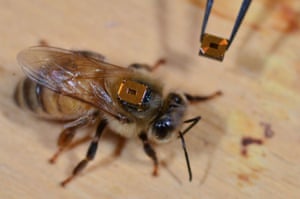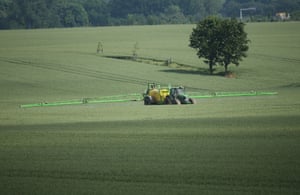https://www.theguardian.com/environment/2017/jun/29/pesticides-damage-survival-of-bee-colonies-landmark-study-shows
Widely used insecticides damage the survival of honeybee colonies, the world’s largest ever field trial has shown for the first time, as well as harming wild bees.
The farm-based research, along with a second new study, also suggests widespread contamination of entire landscapes and a toxic “cocktail effect” from multiple pesticides.
The landmark work provides the most important evidence yet for regulators around the world considering action against neonicotinoids, including in the EU where a total ban is poised to be implemented this autumn. The insecticides are currently banned on flowering crops in the EU.
The negative impacts found varied across different countries, leading the pesticide manufacturers to question whether the results of the research, which they funded, were real. The new research is published in the prestigious peer-review journal Science.
Neonicotinoids represent a quarter of the multi-billion dollar pesticide market but have been repeatedly linked to serious harm in bees in lab-based studies. Bees and other pollinators are vital to food production but are in decline, in part due to loss of habitats and disease. But there had been few realistic field studies to date to address the role of the insecticides and only occasional evidence for colony-level harm in wild bees.
The new research took place at 33 large farmland sites spread across the UK, Germany and Hungary. Honeybees, bumblebees and solitary bees living by insecticide-treated fields of oil seed rape were compared with those in fields where insecticides were not used in the year of the study.
The survival of honeybee colonies was reduced by exposure to the insecticides in the UK and Hungary, but not in Germany, where the bees foraged far less on oil seed rape and had lower levels of disease. The reproductive success of the wild bees was cut as the insecticide exposure increased in all three countries.
“We showed significant negative effects at critical life cycle stages,” said Prof Richard Pywell, from the UK’s Centre for Ecology and Hydrology (CEH), and part of the research team. “If the bees are foraging a lot on oil seed rape, they are clearly at risk. This is a large and important piece of evidence, but it is not the only evidence regulators will look at.”
Scientists not involved in the research backed the conclusions. “Together, the two studies make strong contributions to the growing scientific consensus about the harms of neonicotinoid pesticides to bees,” said Prof James Nieh, at the University of California San Diego. Addressing the differences between countries, Prof Jeremy Kerr, at the University of Ottawa in Canada, said: “Neonicotinoid applications are a kind of reproductive roulette for bees. Depending on local environmental characteristics, they can materially reduce survival prospects.”
The $3m cost of the research was met by Syngenta and Bayer, the companies that sell the two neonicotinoids tested, as part of a voluntary commitment to increase the available field data. But the companies were not involved in the designing, conducting or reporting of the study.
It found that the bees in Germany got just 15% of their food from the oil seed rape fields, compared to 40-50% in the UK and Hungary. “Clearly the bees in Germany are feeding on other flower resources in the landscape and are less exposed to neonics,” said Pywell.
The scientists also discovered that the wild bees were exposed to a neonicotinoid that was not even used in the trial and concluded the harm caused may result from “persistent residues in arable systems due to their widespread and often very frequent use”.
However, both Bayer and Syngenta expressed doubt about the “simplistic” interpretation of complex and “inconsistent” results. “We do not share CEH’s interpretation and remain confident that neonicotinoids are safe when used responsibly” said Richard Schmuck, director of environmental safety at Bayer CropScience.
Peter Campbell, from Syngenta, said: “The negative and positive results reported by CEH could easily be random, ie not real.” He said even taking the results at face value “demonstrates that neonics can be used safely or even with benefit to bees under certain circumstances, such as reported in Germany.”
But CEH’s Pywell said: “We stand by our peer-reviewed paper. We undertook the statistical analysis and reported the findings as we saw them and those are underpinned by the data. We are absolutely independent.”
The second new study published in Science, carried out on corn farms in Canada, also found crops were not the main source of neonicotinoids to which bees were exposed. Instead, the contaminated pollen came from wildflowers, as has been shown recently in the UK.
“This indicates that neonicotinoids, which are water soluble, spill over from fields into the surrounding environment, where they are taken up by other plants that are very attractive to bees,” said Nadia Tsvetkov, at York University in Canada and who led the research.
“The detection of the potential long-term persistence of neonicotinoids in the soil by both studies raises the spectre of a reprise of Rachel Carson’s Silent Spring,” said Prof Robert Paxton at Martin-Luther-University Halle-Wittenberg in Germany.
The Canadian research also found that the presence of realistic levels of a fungicide made the neonicotinoids twice as toxic to bees. “The effect of neonicotinoids on honey bees quickly turns from bad to worse when you add the fungicide boscalid to the mix,” said Prof Valérie Fournier, at Laval University in Canada and also part of the team. Pesticides are not tested in combination by regulators and Kerr said: “This study shows that mixtures matter.”
Environmental campaigners said the new research exposed the full impact of neonicotinoids. “The horror story is clear: we have contaminated our land and water with persistent neonicotinoid pesticides,” said Matt Shardlow, CEO of the charity Buglife.
“This major study marks a watershed moment in the fight to protect our bees [and] fills a crucial gap in our scientific understanding,” said Greenpeace UK’s chief scientist Doug Parr. “The case for a permanent ban on these pesticides is now unassailable, and our politicians will have to take action.”
But Guy Smith, from the National Farmers Union in Britain said neonicotinoids were important in protecting crops and producing food: “We strongly believe that policy decisions – such as restricting the use of neonicotinoids – must be based on sound science which gives strong evidence. And while this CEH study provides more useful information, we still don’t have that definitive evidence for the impact of neonicotinoids.”
Prof David Goulson, a bee expert at the University of Sussex, UK, said: “In the light of these new studies, continuing to claim that use of neonicotinoids in farming does not harm bees is no longer a tenable position. In my view we should also consider the bigger picture; the current model of farming based on huge monocultures treated with dozens of pesticides is causing devastating environmental harm, undermining vital ecosystem services that keep us all alive.”
Since you’re here …
… we have a small favour to ask. More people are reading the Guardian than ever but advertising revenues across the media are falling fast. And unlike many news organisations, we haven’t put up a paywall – we want to keep our journalism as open as we can. So you can see why we need to ask for your help. The Guardian’s independent, investigative journalism takes a lot of time, money and hard work to produce. But we do it because we believe our perspective matters – because it might well be your perspective, too.
I appreciate there not being a paywall: it is more democratic for the media to be available for all and not a commodity to be purchased by a few. I’m happy to make a contribution so others with less means still have access to information.Thomasine F-R.
If everyone who reads our reporting, who likes it, helps to support it, our future would be much more secure.




沒有留言:
張貼留言